Chasing Off the Leopard of Hunger in Uganda
In July 2009, a cry for help went up in parts of northern and eastern Uganda as many people succumbed to the severe and persistent drought that swept across half of the nation. Soroti district was one of the localities that was hardest hit. However, this cry was not new to this part of the country.
Every year Soroti district is listed as a statistic for emergency help. It is said to be one of the districts with the highest levels of poverty in the country, with a very low education level and inhabitants ignorant of cultivation skills. Many have painful memories of war.
With unpredictable weather, from hot and dry conditions that lead to drought and famine, to strong winds and rain that destroy homes and crops, the inhabitants of the land never know what to expect of fickle nature and how to overcome the damage left behind.
To the local inhabitants, the hunger and famine that come with the changing seasons is a leopard looking for the helpless and hopeless to devour. But for a few people in the community, it is time to fight back.
For the beneficiaries of the Asuret and Victory Outreach Orwadai Child Development Centers, it is time to hunt down and chase the “leopard,” and banish it for good.
Continue Reading ›Clean Water for Haiti
The critical need the poor always have for water has been heightened in Haiti after the earthquake. We’ve used various ways to distribute water to our church partners, and we’re looking to our strategic partnerships to continue to meet the short- and long-term needs.
We have a long-standing relationship with Healing Waters International, providing water systems to church partners in Guatemala and the Dominican Republic.
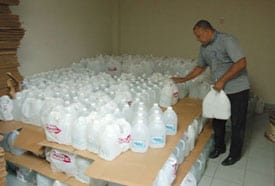 In response to the immense need in Haiti, Healing Waters International has provided 2,500 one-gallon jugs of water at no cost to Compassion Haiti. The water was bottled at the Healing Waters projects at our Dominican Republic church partner sites. If there is continued need, they are equipped to begin bottling on a daily basis.
In response to the immense need in Haiti, Healing Waters International has provided 2,500 one-gallon jugs of water at no cost to Compassion Haiti. The water was bottled at the Healing Waters projects at our Dominican Republic church partner sites. If there is continued need, they are equipped to begin bottling on a daily basis.
The water will be trucked to Haiti along with the family food kits being assembled at our warehouse on the Dominican Republic/Haiti border.
We will also investigate several long-term solutions, such as building water systems at church partner sites in Haiti.
According to Gregg Keen, our Complementary Interventions Director,
“Healing Waters International and Compassion have been good partners for several years. When the disaster hit Haiti, Healing Waters was among the first organizations we called to ask what their response would be. They went to heroic efforts to find available water bottles in the DR when none could be found there. Bottled water will help people to avoid drinking and using contaminated water and the related diseases they can cause, especially in a disaster situation like this one. The impact of this can’t even be measured.”
Healing Waters’ mission is to empower local ministry partners to bring physical, social and spiritual transformation to poor communities, a mission that makes them an excellent partner for us.
Read more about our partnership with Healing Waters International.
Continue Reading ›Thoughts on Haiti From Haiti: 21 Days Later
This was written yesterday by Bob Thorp, a member of our Complementary Interventions team, who has been in Haiti working with our staff since shortly after the earthquake.
“I’ve witnessed a metamorphosis here since arriving here 21 days ago. Then, the words I could use to describe what I saw was a whole city in shock, walking around like zombies, walking wounded. Blank stares. Hollow eyes, caked with mud, now dry from an inability to produce more tears. A survival mentality had set in – each one for themselves. Walk right past someone trapped, because they needed to get home to find their own loved ones.
“Today, car horns blare from 4:00am on late into the night. The continual roar of traffic, occasional squealing of tires, movement everywhere. Life is returning to Port-au-Prince. It started like a drip – in dire need of food and water, street vendors started setting up shop – hawking anything and everything. Fruits and vegetables started appearing. Clothes, used and new – recovered from the rubble of someone else’s house – who knows – now hand on clothes hangers covering a filthy crumbling wall like royal curtains. Mountains of shoes have also made it to the street vendors. Even seen a place where you could buy just one shoe! Not sure why, either they had a niche for those that could only find one of their shoes. Or more morbid, selling shoes to all those who lost limbs because of this tragedy.”
Read the entire blog post.
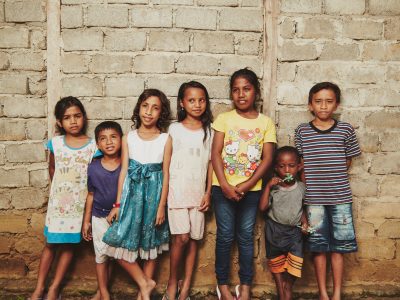
Protecting the Children in Our Program
In Indonesia, children’s rights are a critical issue — as in many countries, women and children are often the most vulnerable members of the community. Compassion Indonesia understands the urgent need to address this issue that often remains silent.
Angelica’s Father Is Missing
Angelica’s father is missing. The last time he’d gone astray, he was found after a few weeks, but now it’s been months. Angelica’s mother explains that her husband is mentally ill. He used to work on the farm, strong as a water buffalo.
“He just went home one day afraid of dying,” says Emma, Angelica’s mother. “After that, he kept on saying ‘they are going to kill me’ over and over until he lost all sense of reality.”
Since then, Emma took on the responsibility of raising their four children. Angelica, 6, is the youngest. Emma worked hard day and night as a house-help, earning only $25 a month, until she developed a heart ailment. (more…)
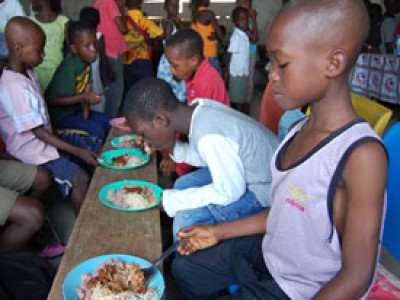
Highly Vulnerable Children: How Do We Help Them?
Our Highly Vulnerable Children initiative deals with poor children who find themselves in very critical conditions demanding special attention and assistance in order to survive.
Heartbreak in Bangladesh: Cyclone Aila
They are the most heartbreaking reports I’ve seen during my 12 months in this job. (Not that you can really quantify or categorize something like this, but last week was the first time I cried reading a crisis report.)
Cyclone Aila. If you haven’t heard about it, don’t feel bad. It really hasn’t been in the news much at all.
None of the major world news sites say anything about it. When I checked yesterday, they all had headlines about singing sensation Susan Boyle, but nothing about Cyclone Aila. However, just because there are no headlines doesn’t mean there is no news.
Over the past week, David Adhikary, our communications specialist in Bangladesh, has been sending photos and reports from the midst of the cyclone’s aftermath. They are devastating. Here are a few excerpts from his reports …
“During the disaster night, the children and their families suffered a lot. The cyclone took down their houses, and after that the dams were destroyed. Some of children had to stand in water for the whole night. The center staff found many of the children in a wet condition.”
“The Compassion center staff and the parents of the children are very anxious about the aftereffects of the flood. The dead animals could cause dangerous diseases, and the probability of malaria is very high.”
“There is not a single house in the village that hasn’t been affected by floodwater. The village is near the sea and the river water is very salty. The floodwater mixed with their water sources and made it impossible to drink.
“The water crisis is the major problem for the people. People were seen drinking the polluted floodwater to put off their thirst. The floodwater is very dirty and stinky. The dead animals and fish are floating all over the water. Children of that area are also drinking the same water.”
Worse …
“The affected families have taken shelter at the nearest market. The families are staying with the animals in the market. The marketplace is badly polluted as the people are using the place for all kinds of uses.
“There is no toilet and the people are using free spaces for a toilet.
“The adult girls are staying with their families in the marketplace. Their parents are very anxious about their daughters because at nighttime they have to stay with lots of unknown people together in the marketplace.”
And perhaps saddest of all …
“This morning we received very sad news about one of the children we assist. Her mother committed suicide just after the cyclone disaster. Their house was broken down and she committed suicide out of her frustrations. She lost her husband last year during Cyclone Sidr. She faced many challenges last year and finally gave up. [The children] are now orphans and vulnerable. They lost their father and mother in two consecutive cyclones. Please join us in pray for these children.”
Oh, God.
It feels like it’s too much, doesn’t it? When I read stuff like this, I find myself begging Jesus to hurry up and return and make all things right. It’s difficult not to get overwhelmed with despair.
The crazy thing is, though, God has placed Compassion right in the midst of this mess. Because of our unique church-based structure, our child development centers are distributing food and water where even relief agencies haven’t been able to access!
Families who lost their homes and have nowhere to cook are receiving hot meals at the child development centers. During the next few weeks, the centers will provide them with dry food, oral rehydration therapy and water purification tablets.
If you sponsor a child in Bangladesh and your child has been affected by Cyclone Aila, we will contact you as soon as we receive information about your child.
Alexander Needs Heart Surgery
Have you ever heard of Atrial Septal Defect (ASD)? Apparently, it’s a congenital heart defect.
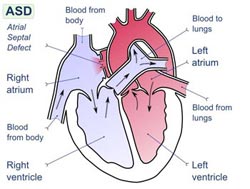 If you have a defect in your interatrial septum, the tissue that divides the right side of your heart from the left side, your blood can get confused. And if that happens, you end up with blood that goes where it shouldn’t. That’s bad.
If you have a defect in your interatrial septum, the tissue that divides the right side of your heart from the left side, your blood can get confused. And if that happens, you end up with blood that goes where it shouldn’t. That’s bad.
In a normal heart, the left ventricle has to produce enough pressure to pump blood throughout the entire body, but the right ventricle has to produce only enough pressure to pump blood to the lungs.
In the case of a large defect, this pressure difference means that blood from the left atrium can flood and enlarge the right side of the heart and, if left untreated, can result in heart failure.
That’s ASD in a nutshell. And this is why I tell you.
 Alexander is an 8-year-old Kenyan boy who has ASD. He is in the third grade and is the youngest child in a family of five. Because his heart has been pumping deoxygenated blood to his growing body for his entire life, Alexander is smaller than most children his age.
Alexander is an 8-year-old Kenyan boy who has ASD. He is in the third grade and is the youngest child in a family of five. Because his heart has been pumping deoxygenated blood to his growing body for his entire life, Alexander is smaller than most children his age.
In August 2008, during an evaluation at the child development center, a pediatrician noticed that Alexander has a heart murmur. Follow-up tests in Nairobi identified the birth defect and recommended a cardiac catheterization procedure and open heart surgery.
But Alexander’s parents are peasant farmers, and his mother sells fruit at the market to earn extra income. They survive on $13.70 per month.
$13.70 a month is barely adequate to meet the family’s basic needs, let alone pay for open heart surgery.
At this point, heart failure is a real possibility for Alexander. However, studies have shown that patients with a surgically repaired ASD have an excellent prognosis, particularly when the operation is done before the age of 25.
But Alexander’s family can’t afford the operation. It costs $8,303.
Alexander has been waiting to receive the surgery for several months now, since early December, but he can’t wait any longer. His condition has recently worsened – which made me think of something Amanda suggested back in February.
“I am just kicking around a few ideas here. What if Compassion had a “Spotlight of the Week” – or “Spotlight of the Month?” It could be either a child (medical need?), family, or small community need. It could even be in the area of the global financial crisis, disaster relief, Child Survival Program, or some other facet of Compassion. For example, one week you could highlight the (global food crisis) need of a community in Uganda to have goats or seeds for crops (or both). After the donations have been given, you could easily follow up with a story in the blog to share the results of the giving.”
So, Alexander has a need. And our objective is to give him a normal heart. Can we do this for him?
Make a donation to help pay for Alexander’s surgery. (Update: May 21, 2009 – You did it! And more. You contributed around $10,000. I expect to have the exact amount tomorrow.)
Thank you for loving this child.
As I receive updates on how Alexander is doing, I will share them with you. I can’t promise you updates with any degree of regularity though. I can just promise that there will be a follow-up.
School for Parents
It is a sunny Sunday morning in San Salvador. It is dry season.
Just as any other Sunday, there are people in the streets coming and going. Housewives with shopping bags going to the local outdoor market to buy the ingredients for lunch, families with their best garments coming from church, and kids going with balls to the park.
The air is filled with freshness and calm, and somehow the future seems brighter for many people going to the local church in the Majucla community.
In a neighborhood named Cuscatancingo, in a poor area of San Salvador, walls full of graffiti, stray dogs, and police and military forces are part of the normal landscape. There are also groups of teenagers with baggy pants and big shirts, some of them with tattoos. They are gang members just ‘chilling.’
In this neighborhood, there is a church named “Tabernaculo Biblico Bautista Majucla” or Baptist Biblical Tabernacle of Majucla. And on this day, at a little bit past 10 in the morning, there are over 100 people in the church.
There is a line outside of the church, and it is growing. The church is almost full. For anybody just passing by, this seems like the second service at the church, but it’s not. The message is a bit different because it is a monthly meeting that the center has with the parents of the children enrolled. (more…)
Seeds for the Harvest
The green leaves start to receive the first rays of the sun, leaving the darkness and cold of the night behind. It is 6 in the morning and the harvest looks ready – ready to be separated from the corn bush, ready to become part of a meal, and ready to be part of a change in the lives of an entire community.
This is the fruit of seeds planted with hope, watered with hard work and dreams, and, at last, harvested with joy.
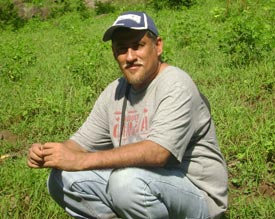 Pastor Damian checks two sacks full of beans. It is just the beginning of the harvest and the fruits already look promising.
Pastor Damian checks two sacks full of beans. It is just the beginning of the harvest and the fruits already look promising.
Another man, Brother Juan, a seasoned farmer with dark skin and gray hair, is a perfect example of a Salvadoran farmer – thin but somehow robust, quiet and wise. Juan has served as an adviser to Pastor Damian since they decided to implement program “Double Seed.”
Juan talks about the beans and how they should keep some leaves and dirt in the sack so the beans will not lose the humidity they need.
“This way, they can last for about a year,” he adds, and smiles, knowing that the efforts made these past three months have given results – promising results that translate into hope.
It has been three months since Double Seed started in the community of Corinto, in Zaragoza, a city located eight miles south of the capital city, San Salvador, in El Salvador.
These past months meant sweat and great efforts for the people, but it also meant hope for a future that did not seem so clear a few months before. (more…)
Trials and Tribulations Reveal God’s Blessing
“Lord, if you allowed this to happen, it’s because you will give me something better.” These were the words that Rosalva expressed when she saw her home torn apart by an earthquake that hit the town of San Lorenzo, in the department of Ahuachapan, about 100 km west of the capital city San Salvador, in El Salvador.
Earlier that day, at about 1 in the morning, the town had felt a tremor. Then, at 11 a.m. of the same day, a 4.6 earthquake hit the area; this is like detonating 1,000 tons of TNT.
Rosalva worked as a baby sitter on the other side of the town, and as soon as she could, she ran home, only to see a big hole in the roof, since most of the tiles had fallen off because of the magnitude of the quake. The walls, made of adobe (a mix of clay and straw), had cracks all over, and the danger of them falling apart was evident.
Thanks to God, her family was okay, but the damages to the house were irreversible. “All four corners of my house were completely separated” says Rosalva, trying to describe how her home, a small, one-room house, had cracks so big that the corners were not together anymore. (more…)
Sewing Mamas Work for a Better Future
For three months the women met, sitting at their sewing machines, not only learning a skill to help them support their families, but also gaining new hope and faith in God.
This exceptional group of women at Centro de Desarrollo Gracia y Poder student center in Honduras benefited through a workshop carried out through our Complementary Interventions programs.
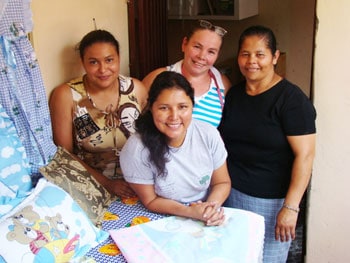
The seed fund was for $3,000 to teach these women, who didn’t know anything about sewing, a skill that could help them generate an income. The training lasted three months, and the participants learned how to create bed comforters and bed sets, curtains and tablecloths.
This activity was a life-changing experience for Gladis A., who didn’t just learn a new skill, but also opened her heart to Jesus through this workshop. (more…)

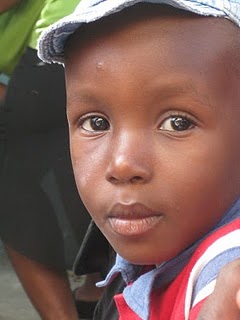 “I’ve witnessed a metamorphosis here since arriving here 21 days ago. Then, the words I could use to describe what I saw was a whole city in shock, walking around like zombies, walking wounded. Blank stares. Hollow eyes, caked with mud, now dry from an inability to produce more tears. A survival mentality had set in – each one for themselves. Walk right past someone trapped, because they needed to get home to find their own loved ones.
“I’ve witnessed a metamorphosis here since arriving here 21 days ago. Then, the words I could use to describe what I saw was a whole city in shock, walking around like zombies, walking wounded. Blank stares. Hollow eyes, caked with mud, now dry from an inability to produce more tears. A survival mentality had set in – each one for themselves. Walk right past someone trapped, because they needed to get home to find their own loved ones.
